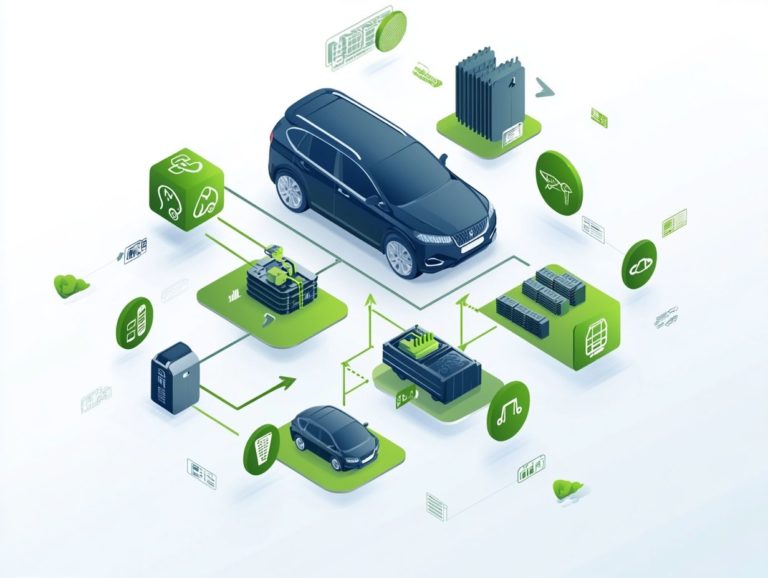Electric Vehicle Impact on Global Warming
As the world confronts the pressing challenges of climate change, electric vehicles (EVs) present themselves as a beacon of hope.
This discussion delves into the technology underpinning EVs, illuminating their environmental advantages compared to traditional vehicles that are major contributors to global warming.
You ll discover how EVs can substantially lower carbon emissions while also exploring their efficiency, costs, and potential to pave the way for a more sustainable future.
Engage with us as we reveal the significant impact of electric vehicles on our planet and their vital role in the fight against climate change.
Contents
- Key Takeaways:
- Environmental Impact of Traditional Vehicles
- Electric Vehicles and Climate Change
- Comparing Electric and Traditional Vehicles
- Future of Electric Vehicles and Global Warming
- Frequently Asked Questions
- What is an electric vehicle and how does it impact global warming?
- How do electric vehicles reduce emissions and contribute to fighting global warming?
- What role do electric vehicles play in transitioning to a more sustainable future?
- How do the production and disposal of electric vehicle batteries impact global warming?
- Are electric vehicles truly more environmentally friendly than traditional vehicles?
- What steps are being taken to encourage the use of electric vehicles and reduce their impact on global warming?
Key Takeaways:

- Electric vehicles have the potential to greatly reduce carbon emissions and mitigate the effects of global warming.
- Compared to traditional vehicles, EVs emit fewer pollutants and have higher efficiency, making them a more environmentally friendly option.
- The world is shifting towards sustainable transportation, and electric vehicles are leading the charge in combatting global warming and creating a cleaner, greener planet.
Understanding Electric Vehicles
Understanding electric vehicles (EVs) is crucial now more than ever! They offer an effective solution for reducing climate pollution and greenhouse gas emissions generated by gas-powered vehicles, making it important to learn about their carbon offset potential.
EV technology uses renewable energy sources, significantly cutting pollutants released from the exhaust of vehicles during operation while also minimizing the carbon footprint associated with the entire vehicle lifecycle from battery manufacturing to disposal.
Experts like David Reichmuth from the Union of Concerned Scientists, along with support from the U.S. Environmental Protection Agency, emphasize that the transition to electric transportation aims to reduce carbon emissions, improve air quality, and actively contribute to the fight against climate change.
Overview of EV Technology
Electric vehicle technology is at the forefront of a new era, rooted in battery manufacturing, renewable energy utilization, and an expanding charging infrastructure that facilitates its widespread adoption.
At the core of this fascinating world lie the batteries, the very heartbeat of performance in electric vehicles. These energy storage systems are what allow your vehicle to transform electrical energy into motion.
You ll encounter various types of batteries, like lithium-ion and solid-state, each with its own unique advantages in terms of efficiency, weight, and lifespan. Innovations in battery management systems further elevate their performance, ensuring you get the most out of each cycle.
As this technological landscape evolves, a robust network of charging stations is emerging, designed to make it effortless for you to recharge your vehicle whenever needed.
Recent advancements, such as ultra-fast charging and wireless charging systems, are dismantling the barriers to adoption and paving the way for a sustainable transportation future.
Environmental Impact of Traditional Vehicles
The environmental impact of traditional gas-powered vehicles is significant, playing a major role in climate pollution, greenhouse gas emissions, and deteriorating air quality in both urban and rural settings.
These vehicles emit tailpipe pollutants that not only fuel global warming but also pose serious health risks to individuals by worsening air quality.
Research indicates that the transportation sector ranks among the top contributors to carbon emissions, highlighting the urgent need for action to address its detrimental effects on climate change.
Consider making electric vehicles your next car purchase to contribute to a greener future!
Contribution to Global Warming

Gas-powered vehicles significantly contribute to global warming because of their greenhouse gas emissions, which trap heat in the atmosphere and intensify climate change.
These vehicles release carbon dioxide (CO2) and other harmful pollutants. Statistics reveal that they account for nearly 29% of total greenhouse gas emissions in the United States. Over the past few decades, this reliance on fossil fuels has deteriorated air quality and played a crucial role in escalating global temperatures.
For example, studies show that a single gas-powered car emits approximately 4.6 metric tons of CO2 each year. In contrast, electric vehicles (EVs) drastically reduce these emissions, particularly when powered by renewable energy sources.
As the demand for cleaner alternatives rises, numerous studies underscore how shifting to EVs could lead to a remarkable reduction of over 70% in emissions, paving the way for sustainable transportation.
Electric Vehicles and Climate Change
Electric vehicles are essential in the fight against climate change. They dramatically lower carbon emissions when compared to traditional gas-powered vehicles. By embracing this shift and understanding the role of electric vehicles in climate change, you contribute to the global movement aimed at reducing emissions and fostering a more sustainable future.
Reducing Carbon Emissions
The adoption of electric vehicles is vital for reducing carbon emissions, as they harness renewable energy sources, contributing to cleaner air and benefiting both the climate and public health.
Transitioning from traditional gasoline-powered cars to electric alternatives decreases your direct emissions and supports a cleaner energy ecosystem. According to the U.S. Environmental Protection Agency, the entire lifecycle of electric vehicles including production, operation, and end-of-life processes can significantly reduce greenhouse gas emissions, especially when powered by renewable sources like wind and solar.
With advancements in battery technology and recycling methods, the environmental footprint of these vehicles continues to shrink, highlighting their vital role in a sustainable future. Understanding the impact of climate change on EV adoption rates is crucial for broader climate strategies designed to combat global warming.
Comparing Electric and Traditional Vehicles
When comparing electric vehicles to traditional gas-powered ones, notable distinctions emerge in emissions, energy efficiency, and the overall costs tied to ownership and operation.
Emissions, Efficiency, and Cost

In terms of emissions, energy efficiency, and cost, electric vehicles often outperform gas-powered ones, making them a smart choice for both your wallet and the planet.
This becomes particularly evident when examining the emissions data, which shows that electric vehicles generate significantly lower greenhouse gas emissions over their lifetime. The energy efficiency metrics further highlight this advantage; electric models typically convert over 60% of the electrical energy from the grid into power at the wheels, while traditional vehicles achieve only around 20% efficiency from their fuel.
A thorough cost analysis reveals that electric vehicles can lead to considerable fuel savings and lower maintenance expenses, mainly due to having fewer moving parts. Additionally, you can often take advantage of various incentives, such as tax breaks and rebates, which further enhance the financial appeal of electric options.
Future of Electric Vehicles and Global Warming
Now is the time to embrace electric vehicles to combat global warming effectively. Understanding how EVs reduce carbon footprint is crucial, especially as advancements in renewable energy and charging infrastructure emerge, paving the way for a cleaner, more sustainable transportation sector.
By embracing this evolution, you enhance your mobility choices and contribute to a healthier planet for generations to come.
Join the movement towards cleaner transportation make the switch to electric today!
Potential for Positive Impact
Electric vehicles present a remarkable opportunity for you to make a significant impact on global warming by cutting emissions and supporting renewable energy. For more insights, explore how electric vehicles and their impact on climate action can contribute to a sustainable future.
As you and others embrace electric vehicles, studies indicate that greenhouse gas emissions could drop by nearly 50% by 2030. This essential move is crucial for addressing climate change. Look at successful case studies like California’s ambitious EV strategy and Norway’s impressive adoption rates of electric cars. These examples highlight how targeted policies and incentives can drive widespread adoption, showcasing how electric vehicles can help save the planet.
By following these models, you contribute to a reduction in air pollution and help stimulate demand for renewable energy sources such as wind and solar. This transition is vital for our future! It not only meets national climate goals but also fosters greater energy sustainability and reduces our reliance on fossil fuels for future generations.
This video explains how electric vehicles can impact global warming positively.
Frequently Asked Questions
What is an electric vehicle and how does it impact global warming?

An electric vehicle (EV) runs on electricity instead of gasoline or diesel. They have a much lower carbon footprint, meaning they contribute less to global warming compared to traditional vehicles.
How do electric vehicles reduce emissions and contribute to fighting global warming?
Electric vehicles produce zero direct emissions, as they do not burn fossil fuels. This leads to cleaner air and significantly reduces greenhouse gases, highlighting the benefits of EVs in reducing greenhouse gases that contribute to global warming.
What role do electric vehicles play in transitioning to a more sustainable future?
Electric vehicles are key to a sustainable future. By decreasing our reliance on fossil fuels and promoting clean energy, they help mitigate global warming and foster a sustainable transportation system.
How do the production and disposal of electric vehicle batteries impact global warming?
The production and disposal of electric vehicle batteries do impact global warming. However, with increasing use of renewable energy in battery production and proper recycling, this impact is much lower than that of traditional vehicle batteries, highlighting the global impact of electric vehicle adoption.
Are electric vehicles truly more environmentally friendly than traditional vehicles?
Yes, electric vehicles are generally more environmentally friendly. While they still have some impact on global warming, it’s significantly less than the emissions from gasoline and diesel vehicles, as highlighted in the effect of EV adoption on pollution reduction.
What steps are being taken to encourage the use of electric vehicles and reduce their impact on global warming?
Governments and organizations worldwide are implementing incentives like tax credits and subsidies to encourage electric vehicle adoption. Ongoing efforts also focus on improving battery technology and expanding charging infrastructure to make electric vehicles more accessible and convenient.




